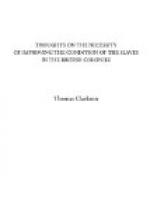The measure then, which I have been proposing, is not unreasonable. I trust it would not be injurious to the interests of the West Indians themselves. These are at present, it is said, in great distress; and so they have been for years; and so they will still be (and moreover they will be getting worse and worse) so long as they continue slavery. How can such a wicked, such an ill-framed system succeed? Has not the Almighty in his moral government of the world stamped a character upon human actions, and given such a turn to their operations, that the balance should be ultimately in favour of virtue? Has he not taken from those, who act wickedly, the power of discerning the right path? or has he not so confounded their faculties, that they are for ever frustrating their own schemes? It is only to know the practice of our planters to be assured, that it will bring on difficulty after difficulty, and loss after loss, till it will end in ruin. If a man were to sit down and to try to invent a ruinous system of agriculture, could he devise one more to his mind than that which they have been in the habit of using? Let us look at some of the more striking parts of this system. The first that stares us in the face, is the unnatural and destructive practice of forced labour. Here we see men working without any rational stimulus to elicit their exertions, and therefore they must be followed by drivers with whips in their hands. Well might it be said by Mr. Botham to the Committees of Privy-council and House of Commons, “Let it be considered, how much labour is lost by the persons overseeing the forced labourer, which is saved when he works for his own profit;” and, notwithstanding all the vigilance and whipping of these drivers, I have proved that the slaves do more for themselves in an afternoon, than in a whole day when they work for their masters. It was doubtless the conviction that forced labour was unprofitable, as well as that there would be less of human suffering, which made Mr. Steele take away the whips from his drivers, as the very first step necessary in his improved system, or as the sine qua non without which such a system could not properly be begun; and did not this very measure alter the face of his affairs in point of profit in three years after it had been put into operation? And here it must be observed, that, if ever emancipation should be begun by our planters, this must be (however they may dislike to part with arbitrary power) as much a first step with them as it was with Mr. Steele. Forced labour stands at the head of the catalogue of those nuisances belonging to slavery, which oppose the planter’s gain. It must be removed before any thing else can be done. See what mischiefs it leads to, independently of its want of profit. It is impossible that forced labour can be kept up from day to day without injury to the constitution of the slaves; and if their health is injured, the




